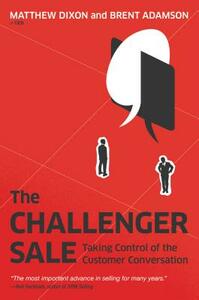You need to sign in or sign up before continuing.
Take a photo of a barcode or cover
68 reviews for:
The Challenger Sale: Taking Control of the Customer Conversation
Matthew Dixon, Brent Adamson
68 reviews for:
The Challenger Sale: Taking Control of the Customer Conversation
Matthew Dixon, Brent Adamson
challenging
informative
inspiring
reflective
fast-paced
informative
reflective
medium-paced
Another one of those book that can be summarized in about 50 pages. The points author makes are valuable but I'm not in love with his format of narrative. The case studies were great.
challenging
informative
inspiring
reflective
slow-paced
Very dry read but brings up important concepts, such as taking control of the sale, acquiring insights beforehand & generally doing your homework. Key takeaway for me is to keep learning and don't think you need to be born with skills. Everyone can become a great seller with effort and time. Recommend this for anyone, not only in sales, but just in general for keeping in touch with the current times of how selling works in this digital era.
informative
slow-paced
I read this book for work, it is different than any other books I have read. I am not a salesperson but I work alongside them so it is helpful to learn about a key sales model and how the organisation must support salespeople in their sales pursuits, I think that it will help in my job as it provided context and understanding of what the sales of process is/should be like.
It uses research into salespeople, managers and organisations to back up its claims and provides illustrative examples of key methods. It was useful, just not my usual preference, even for business books (in my personal reading life- I don’t read books written by cisgender men).
It uses research into salespeople, managers and organisations to back up its claims and provides illustrative examples of key methods. It was useful, just not my usual preference, even for business books (in my personal reading life- I don’t read books written by cisgender men).
If you’re in B2B sales this sales philosophy is not only worth reading, but worthy of study and practice. I’ll be revisiting this book and in the mean time I’ll be implementing some of the key practices in the challenger sales philosophy to improve how I consult and help my clients make better decisions, faster.
challenging
informative
reflective
medium-paced
A well built plan to transform your methodology for meeting your client's need and your business objectives. Not easy or quick to adopt but appears worth the effort if you are patient and build the foundation properly.
I've never read a book about sales specifically, and this one was a great entry point. I had so many "ah-hah" moments while reading it- "so that's why our best salespeople pitch this way!" If I were leading a sales org, I would reread this, and have my managers and employees read it, too. Biggest take-away: the best sales reps offer their customers some new insight, or way of seeing things differently (and conveniently, that insight leads them down the path toward their product as a solution).
I read this book because Taylor had to read it for work at UPS and mentioned it was good; unfortunately he mentioned it was good after reading only the first chapter or two and the message of this book, definitely could have been conveyed in one chapter instead of nine.
Basically, there are 5 types of salespeople:
-The Hard worker
-The Relationship builder
-The Lone wolf
-The Reactive problem solver
-The Challenger
Obviously (read the name of the book), the "Challenger" has been shown to be the most effective type of salesperson, both post-recession when this book was presumably written as well as for the foreseeable future. The challenger sale is a 3-pronged method:
1. Teach (provide your customer with new market insight or ideas they haven't thought about before)
2. Tailor (change your message depending on who you are talking to in the org [CEO vs. tech specialist])
3. Take control
A few more pointers on "building challengers" in your organization:
-Challengers are made not just born
-the combination of their skills is what matters most
-challenging is more about organizational capabilities than individual skills
-building challengers doesn't happen overnight
For organizations to win business, they should build the challenger model into their salespeople and company culture at an executive level.
Basically, there are 5 types of salespeople:
-The Hard worker
-The Relationship builder
-The Lone wolf
-The Reactive problem solver
-The Challenger
Obviously (read the name of the book), the "Challenger" has been shown to be the most effective type of salesperson, both post-recession when this book was presumably written as well as for the foreseeable future. The challenger sale is a 3-pronged method:
1. Teach (provide your customer with new market insight or ideas they haven't thought about before)
2. Tailor (change your message depending on who you are talking to in the org [CEO vs. tech specialist])
3. Take control
A few more pointers on "building challengers" in your organization:
-Challengers are made not just born
-the combination of their skills is what matters most
-challenging is more about organizational capabilities than individual skills
-building challengers doesn't happen overnight
For organizations to win business, they should build the challenger model into their salespeople and company culture at an executive level.



